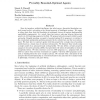Free Online Productivity Tools
i2Speak
i2Symbol
i2OCR
iTex2Img
iWeb2Print
iWeb2Shot
i2Type
iPdf2Split
iPdf2Merge
i2Bopomofo
i2Arabic
i2Style
i2Image
i2PDF
iLatex2Rtf
Sci2ools
105
click to vote
IJCAI
1993
1993
Provably Bounded Optimal Agents
Since its inception, arti cial intelligence has relied upon a theoretical foundation centred around perfect rationality as the desired property of intelligent systems. We argue, as others have done, that this foundation is inadequate because it imposes fundamentally unsatis able requirements. As a result, there has arisen a wide gap between theory and practicein AI, hindering progress in the eld. We proposeinstead a propertycalled bounded optimality. Roughly speaking, an agent is bounded-optimal if its program is a solution to the constrained optimization problem presented by its architecture and the task environment. We show how to construct agents with this property for a simple class of machine architectures in a broad class of real-time environments. We illustrate these results using a simple model of an automated mail sorting facility. We also de ne a weaker property, asymptotic bounded optimality
ABO
, that generalizes the notion of optimality in classical complexity theory. We...
Arti Cial Intelligence | Asymptotic Bounded Optimality | IJCAI 1993 | IJCAI 2007 | Universal Abo Programs |
Related Content
| Added | 02 Nov 2010 |
| Updated | 02 Nov 2010 |
| Type | Conference |
| Year | 1993 |
| Where | IJCAI |
| Authors | Stuart J. Russell, Devika Subramanian, Ronald Parr |
Comments (0)

